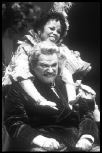COMIC OPERA IS funny because people are funny, so the more puppetlike a production’s characters are, the less funny it is. That’s my theory, at least, but opera directors who disagree can find safe haven at Seattle Opera, where Stephen Terrell has taken commedia dell’arte as a model for the current production of Donizetti’s Don Pasquale (running through Saturday, Jan. 25 at the Mercer Arts Arena).
Fair enough, Pasquale‘s four main characters—Ernesto, Norina, Pasquale, and Malatesta—clearly echo the stock types of commedia dell’arte: two young lovers, the pompous Pantalone, the wily Dottore. But if you want to talk stage history, consider the reason comic opera flourished in the first place: as a counterweight to opera seria, all about gods, heroes, and noblemen. Opera buffa presented the middle class and their servants in domestic settings—much like the audience, who came to enjoy society’s follies whenever they weren’t in the mood for elevated passions. And in Terrell’s production, commedia influence means mechanical hyperactivity—little gestures, mugs, and twitches that never come from or add up to a character, just bits of shtick, glued like sequins onto a paper doll.
Terrell’s is a one-size-fits-all concept, applied even to one of comic opera’s most multifaceted characters. Pasquale‘s lead soprano part is really three roles in one: Norina, Ernesto’s secret lover, poses as “Sofronia,” fresh from the convent and presented to Ernesto’s uncle Pasquale as the perfect marriage candidate. But once they’re wed, she turns into a spendthrift harpy; Pasquale, to be rid of her, consents to Ernesto’s marriage to Norina. The plot is revealed. Laughter, reconciliation, curtain. Yet as Norina, the shy Sofronia, or the shrewish Sofronia, Harolyn Blackwell was busy and stylized in always the same way, with hips, shoulders, and arms ever on the go.
She sang, though, with grace and precision; right from her demanding entrance aria, she led the cast in Italianate ease and flexibility. As Ernesto, Jeffrey Francis offered some very pretty soft notes but tended to stiffen up anywhere above a mezzo-piano. He relaxed by his Act III serenade—less effortful, if still somewhat mannered. In the title role, Eduardo Chama generally seemed unfocused, with pitch, rhythm, and projection often not quite there.
David Centers’ sets were handsome, especially Pasquale’s salon, all in rich browns that looked carved out of chocolate. But in this inviting setting, all we got were caricatures to laugh at rather than human beings to laugh with.








